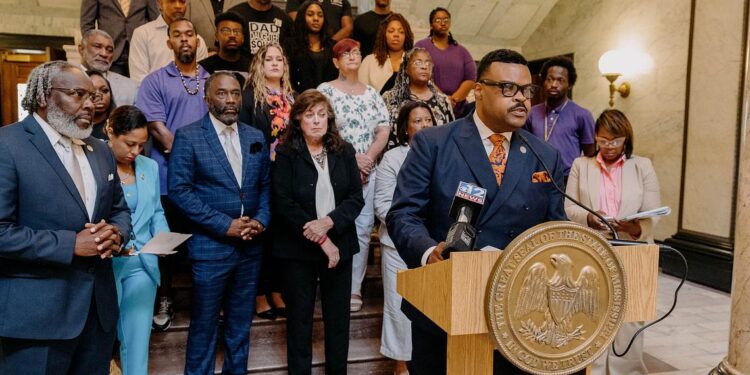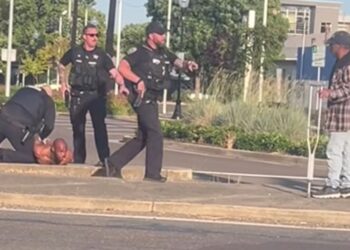John Cook moved back to Mississippi in 2022 after about 15 years of living in the Atlanta area, where he ran his own telecom business maintaining fiber optic lines.
Hurricane Katrina had driven Cook from his home on the Mississippi Gulf Coast in 2005, but now, his business sold, Cook was glad to return to the Magnolia State. He bought a large farm-style house on land in the state’s Pine Belt region.
But in one important respect to Cook, he soon found the state didn’t fully welcome him.
Cook, now 66, learned from local voting officials that he was barred from casting a ballot because he had several 40-year-old felony convictions, including grand larceny. Yet he had legally voted in Georgia for years.
“I can’t come back to my home state and vote?” Cook said. “It’s a life sentence. I’m being deprived even though I’ve served my time.”
In most U.S. states, Cook would have been able to vote as he did in Georgia, despite his prior conviction. Mississippi is among 11 states that ban at least some people with felony convictions from voting for life, according to the Sentencing Project.
Critics deem Mississippi’s law especially confusing. The state imposes a lifetime voting ban on people convicted for a range of violent and nonviolent crimes, but allows people convicted of many other crimes to retain their voting rights, even while still in prison.
A voting reform bill this year in the Mississippi Legislature would have benefited Cook and thousands of other disenfranchised voters convicted of nonviolent offenses — such as writing a bad check — but it died in the state Senate. The bill would have automatically restored their right to vote starting with the November election.
Legislative inaction early this year was followed in July by a decision from the U.S. Fifth Circuit Court of Appeals that ruled against a claim that Mississippi’s law violates the Eighth Amendment’s prohibition of cruel and unusual punishment.
This means that even as people across the country prepare to cast their presidential ballots, Cook and tens of thousands of other Mississippians remain locked out of the electoral process.
No state agency comprehensively tracks the total number of people who have lost their voting rights in Mississippi. But court records reviewed by The Marshall Project – Jackson show that at least 55,000 people have lost their voting rights in the state since 1994.
The actual number of disenfranchised people is almost certainly higher, because records reviewed by the news organization don’t include people like Cook, whose convictions came before 1994. The court records since 1994 are also likely incomplete.
Three judges on the Fifth Circuit dissented from the court’s July opinion and pointed to the example of people like Cook and thousands of others like him who have long served their sentence. Dissenters wrote that “Denying released offenders the right to vote takes away their full dignity as citizens” and “separates them from the rest of their community.”
The majority of the Fifth Circuit judges, on the other hand, suggested opponents of the law should seek change through the Legislature rather than the courts.
Despite the Legislature’s failure to approve such change, vocal defenders of the current system are few, even in the state Senate where reform legislation died this year. State Sen. Angela Hill, a Republican from the Gulf Coast area, was a key figure blocking the House bill but said in a radio interview this year the list of disenfranchising crimes should perhaps be narrower, without offering specifics.
State Rep. Kabir Karriem, a Democrat from the northeast Mississippi city of Columbus, has long been an emphatic supporter of reforming the state’s felony disenfranchisement laws.

He authored the bipartisan bill that passed the House this year and said he intends to keep pushing to overhaul the state’s felony disenfranchisement laws so that no one feels unwelcome in their home state.
“Democracy,” said Karriem, “is built on everyone having the right to elect their representative.”
In his late teens and early 20s in the 1970s, Cook began using drugs and committed a string of drug and property crimes. At the time, voting was not on his mind.
“I didn’t vote,” Cook said. “I just didn’t care.”
Cook served several years in state prison and was released in 1982. He still wasn’t thinking about his right to vote. Instead, he began rebuilding his life.
From a job marking underground phone lines with a can of paint, Cook eventually rose to own several telecommunications service businesses, based first on Mississippi’s Gulf Coast, and then in the Atlanta area.
It was in Georgia that Cook registered to vote in his late 40s and cast a ballot for the first time in his life.
“I hold the vote precious,” Cook said. “That’s my voice.”
Cook’s convictions show the complexity that people with felony convictions must navigate to answer a simple question — can I vote? His convictions for drug possession and even burglary did not impact his right to vote in Mississippi. People with these convictions can cast a ballot even from prison. However, because Cook also has a conviction for grand larceny, he can no longer vote in the state.
A resident can regain their voting rights in Mississippi, but it’s not an easy or accessible process. Either the governor or the Legislature can restore a person’s voting rights, but that doesn’t happen often. In this year’s legislative session, lawmakers restored voting rights to 16 people, out of 49 restoration bills that were introduced.
Cook didn’t even know restoration was possible.
But about an hour up the road from where Cook lives, Gerald Laird did know it was possible.
Laird, 54, lives in the rural town of Prentiss, where he grew up.
Laird began voting as soon as he reached age 18. He remembers casting his first vote in the presidential election between George H.W. Bush and Michael Dukakis in 1988.
Legislation to restore his voting rights has been introduced in the last four legislative sessions, without success.
Laird was convicted in 2003 for a bank robbery he committed when he was addicted to drugs. People with robbery convictions tend to face a steeper path toward restoration in the Legislature.
Years after his robbery conviction, Laird believes he’s shown himself to be a valuable local community member.
After his release from state prison, Laird earned a graduate degree and worked for years for Mississippi’s Child Protection Services, where the state trusted him to help vulnerable children. He also worked for his family’s funeral home business and is now a full-time caregiver for his elderly mother.
On each election day, Laird takes his mother to their local voting precinct to cast her ballot. She doesn’t miss an election, whether federal, state or local, he said.
He recalled the first time he took her to vote. She went inside the small precinct building while he sat in the car.
“I just remember feeling depressed because I couldn’t go in to vote,” Laird said.
Laird is keenly aware that the state’s disenfranchisement system has roots in the state’s racist Jim Crow constitution of 1890. He said the laws represent “pure politics” that continue to lock him and others out of full participation in their communities.

“If you are there to represent all the people, shouldn’t all of the people have a say-so?” Laird said about elected officials. “They make decisions for me and about me, and I can’t make a decision about who’s there to do these things for me and about me.”
Racial disparities remain clear in the law’s present-day impact.
Almost 60% of people convicted of disenfranchising crimes from 1994 through 2023 are Black, according to The Marshall Project – Jackson’s review of court data. The news organization’s findings also mirror an academic study done to support one of the federal lawsuits, which covered the years from 1994 to 2017. Statewide, nearly 40% of voting-age adults are Black.
These disparities have spurred repeated litigation.
Before the Fifth Circuit this year rejected the Eighth Amendment arguments against Mississippi’s disenfranchisement law, that same appeals court upheld the law twice before, rejecting arguments that the law must be struck down because of its racist origin and racial impact on voting. Judges in 1998 and 2022 reasoned that since the original list of disenfranchising crimes has been modified — burglary was removed in 1950 and murder and rape were added in 1968 — the racist intent of the original law has been “cured.”
Last year, the U.S. Supreme Court declined to hear claims about Mississippi’s disenfranchisement law on appeal, leaving the 2022 Fifth Circuit ruling in place.
However, Associate Justice Ketanji Brown Jackson said the high court should have taken up the case. In her dissent, she wrote that “Mississippians can only hope that they will not have to wait another century for a judicial knight-errant. Constitutional wrongs do not right themselves.”
Laird and Cook said they both believe the state’s disenfranchisement law needs to be reformed.
“You can’t just use something from 1890,” Cook said, “to tell me here in 2024 that I’m still a bad man.”



























